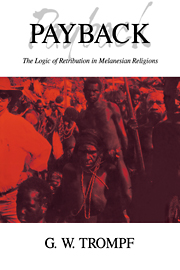Book contents
- Front Matter
- Contents
- Illustrations and tables
- Preface
- Abbreviations
- Preliminaries: The Theory of Retributive Logic
- Part One 'TRADITION'
- Chapter 1 Revenge
- Chapter 2 Reciprocity
- Chapter 3 Integrating and Explaining Significant Events
- Part Two 'CARGO CULTISM'
- Part Three 'MODERNIZATION'
- Conclusions and Recommendations
- Bibliography
- Index of Melanesian Cultures
- General Index
Chapter 2 - Reciprocity
Published online by Cambridge University Press: 22 September 2009
- Front Matter
- Contents
- Illustrations and tables
- Preface
- Abbreviations
- Preliminaries: The Theory of Retributive Logic
- Part One 'TRADITION'
- Chapter 1 Revenge
- Chapter 2 Reciprocity
- Chapter 3 Integrating and Explaining Significant Events
- Part Two 'CARGO CULTISM'
- Part Three 'MODERNIZATION'
- Conclusions and Recommendations
- Bibliography
- Index of Melanesian Cultures
- General Index
Summary
Negative payback, as thought and action, does not exhaust the scope of retributive logic and its practical implications. Melanesians reward and forgive as well as punish and avenge, and they are famed for their reciprocal principles of exchange and sacrificial generosity; so, it now bears looking at the other face of the coin. An adequate examination will be arduous, however, not only because the relevant material continues to be complex and unmanageable, but also because the coin of retributive logic can be flipped between ‘heads and tails’ more easily than we might have imagined, so that punishments (such as those brought upon a child) may be rewards in the long run, while rewards (as in sumptuous presentations of food, among the Massim, for example) may be signs of aggression or of the desire to be magister (Young 1971; cf. Serpenti 1977: 217–64 on the Kolepom). In an enterprise already too daring, we must needs play the game of hermeneutics very cautiously indeed.
Concessions for peace: gifts for alliance
Peace-making makes a good starting-point, since the concession to arrest fragrant war has at least potentially far-reaching consequences for whole groups. A moot point though it is as to whether traditional revenge warfare could ever be ‘finally closed’ between long-standing enemy groups; most cultures had devices to bring about at least the temporary halt to hostilities.
- Type
- Chapter
- Information
- PaybackThe Logic of Retribution in Melanesian Religions, pp. 97 - 127Publisher: Cambridge University PressPrint publication year: 1994

